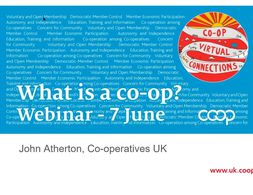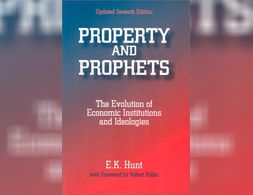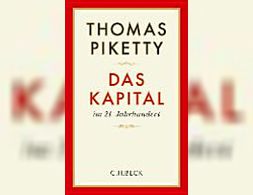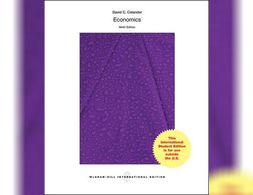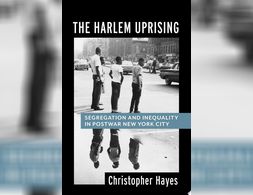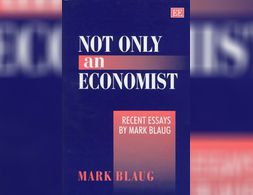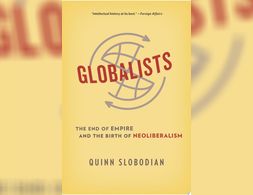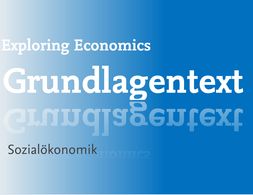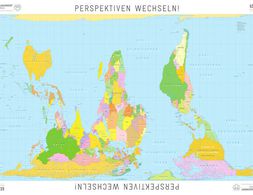262 Ergebnisse
In spite of the manifold critique about the state of economics in the aftermath of the financial crisis, an even increasing presence of economists and economic experts can be observed in the public sphere during the last years. On the one hand this reflects the still dominant position of economics in the social sciences as well as the sometimes ignorant attitude of economists towards findings of other social sciences. On the other hand this paper shows that the public debate on politico-economic issues among economists is dominated by a specific subgroup of economists, tightly connected to an institutional network of “German neoliberalism”. This group of “public economists” (i) is dominant in public debates even after the financial crisis, (ii) reproduces the formative German economic imaginary of the Social Market Economy in a German neoliberal interpretation and (iii) has a good access to German economic policymaking, rooted in a long history of economic policy advice.
This video explains what a co-operative is, discussing the different types, their history and purposes, before moving on to discuss the current state of the co-operative movement.
Tetteh Hormeku-Ajei, member of the Post-Colonialisms Today Working Group, provides insight on the history of primary commodity export dependence in Africa, and relates it to the difficulties African governments are facing finding necessary resources to tackle the COVID-19 pandemic.
In this piece Alexander Kravchuk gives an overview over the history of dept dependency in Ukraine, highlighting especially the role of international creditors and the negative socio-economic impacts of debt dependency for the Ukrainian economy.
This book is about history of monetary economic thought. From the 18th century with Hume and Smith to the early 20th, the author explains the different schools of thought regarding the monetary theories and policies and specially the central banking theory.
Hunt (economics, U. of Utah) provides a concise history of the rise and triumph of capitalism, centering mainly on England until 1800 and the U.S. since 1800. He traces the evolution of some of the most significant institutions of capitalism, analyzes the recurring ideological defenses and the radical critiques of capitalism, and examines intellectual developments which were occurring at the same time.
What are the grand dynamics that drive the accumulation and distribution of capital? Questions about the long-term evolution of inequality, the concentration of wealth, and the prospects for economic growth lie at the heart of political economy. This original work reorients our understanding of economic history and confronts us with sobering lessons for today.
Helps students succeed in the principles of economics course. This title offers trademark colloquial approach that focuses on modern economics, institutions, history, and modeling, and is organized around learning objectives to make it easier for students to understand the material and for instructors to build assignments within Connect Plus.
In this classic work of economic history and social theory, Karl Polanyi analyzes the economic and social changes brought about by the "great transformation" of the Industrial Revolution.
Christopher Hayes examines the causes and consequences of the uprisings, from the city’s history of racial segregation in education, housing, and employment to the ways in which the police both neglected and exploited Black neighborhoods.
Lean Logic is the late David Fleming’s masterpiece, the product of more than thirty years’ work and a testament to the creative brilliance of one of Britain’s most important intellectuals. A dictionary unlike any other, it leads readers through Fleming’s stimulating exploration of fields as diverse as culture, history, science, art, logic, ethics, myth, economics, and anthropology, being made up of four hundred and four engaging essay-entries covering topics such as Boredom, Community, Debt, Growth, Harmless Lunatics, Land, Lean Thinking, Nanotechnology, Play, Religion, Spirit, Trust, and Utopia. The threads running through every entry are Fleming’s deft and original analysis of how our present market-based economy is destroying the very foundations—ecological, economic, and cultural— on which it depends, and his core focus: a compelling, grounded vision for a cohesive society that might weather the consequences
A collection of the prolific economist's essays written since 1990, in sections on history of economic thought, methodology of economics, economics of education, cultural economics, and book reviews. Subjects include the work of Adam Smith, Hayek, and Keynes, the economic case for subsidies for the arts, the historiography of economics, and education and the employment contract. Annotation copyright by Book News, Inc., Portland, OR
In the course Sociology and Socialism, students engage with classical theories of socialism as well as their applications in a variety of historical and international contexts. Staunchly interdisciplinary, the course utilizes expertise in philosophy, history, economics, sociology, anthropology and political theory.
In this video, Clara Mattei investigates the function of austerity in relation the stabilization of capitalism as a form of social order build around private property, wage labor and class relations. In order to develop this argument, she situates austerity in the history of World War 1 and its revolutionary aftermath. Zooming in on the politicization of the economy and the associated threat to class society that emerged in the period, she highlights how austerity was a „tool of reaction“ that was successful in curtailing demands for economic democracy and a society free from class oppression.
In the first intellectual history of neoliberal globalism, Quinn Slobodian follows neoliberal thinkers from the Habsburg Empire’s fall to the creation of the World Trade Organization to show that neoliberalism emerged less to shrink government and abolish regulations than to deploy them globally to protect capitalism.
This is an introductory course into economics that navigates the intellectual history of political economy in a self-contained and non-technical manner. The course centres on the classical concept of political economy by emphasizing the moral and ethical problems that markets solve or may not solve.
The Routledge Handbook of Feminist Economics presents a comprehensive overview of the contributions of feminist economics to the discipline of economics and beyond. Each chapter situates the topic within the history of the field, reflects upon current debates, and looks forward to identify cutting-edge research. Consistent with feminist economics' goal of strong objectivity, this Handbook compiles contributions from different traditions in feminist economics (including but not limited to Marxian political economy, institutionalist economics, ecological economics and neoclassical economics) and from different disciplines (such as economics, philosophy and political science). The Handbook delineates the social provisioning methodology and highlights its insights for the development of feminist economics. The contributors are a diverse mix of established and rising scholars of feminist economics from around the globe who skilfully frame the current state and future direction of feminist economic scholarship. This carefully crafted volume will be an essential resource for researchers and instructors of feminist economics.
Thomas Piketty's Capital in the Twenty-First Century is the most widely discussed work of economics in recent history, selling millions of copies in dozens of languages. But are its analyses of inequality and economic growth on target? Where should researchers go from here in exploring the ideas Piketty pushed to the forefront of global conversation? A cast of economists and other social scientists tackle these questions in dialogue with Piketty, in what is sure to be a much-debated book in its own right.
Die Sozialökonomik ist 1. die historische Fachbezeichnung einer integrierten Sozial- und Wirtschaftswissenschaft (vgl. Einzelwissenschaft, Disziplin) und 2. ein kontextabhängiger Ausdruck für komplexe Zusammenhänge von Gesellschaft und Wirtschaft (vgl. Sozialökonomie bzw. Sozioökonomie).
Wie einseitig ist die Wirtschaftswissenschaft? Studienreihe der Universität Siegen.
This paper starts with an evaluation of three common arguments against pluralism in economics: (1) the claim that economics is already pluralist, (2) the argument that if there was the need for greater plurality, it would emerge on its own, and (3) the assertion that pluralism means ‘anything goes’ and is thus unscientific. Pluralist responses to all three arguments are summarized. The third argument is identified to relate to a greater challenge for pluralism: an epistemological trade-off between diversity and consensus that suggests moving from a discussion about ‘pros’ and ‘cons’ towards a discussion about the adequate degree of plurality. We instantiate the trade-off by showing how it originates from two main challenges: the need to derive adequate quality criteria for a pluralist economics, and the necessity to propose strategies that ensure the communication across different research programs. The paper concludes with some strategies to meet these challenges.
In this ambitious and impressive new book, journalist Howard French seeks to excavate the long elided central importance of the African continent as the “linchpin of the machine of modernity.” In the story of modernity, he writes, the role of Africa is diminished, trivialized, and erased, and by filling in some gaps in this story, he retells the story of modernity.
Institutional economics focuses on the role of social institutions in terms of laws or contracts, but also those of social norms and patterns of human behaviour that are connected to the social organisation of production, distribution and consumption in the economy.
If there’s one method economists have neglected the most, it’s qualitative research. Whereas economists favour mathematical models and statistics, qualitative research seeks to understand the world through intensive investigation of particular circumstances, which usually entails interviewing people directly about their experiences. While this may sound simple to quantitative types the style, purpose, context, and interpretation of an interview can vary widely. Because of this variety, I have written a longer post than usual on this topic rather than doing it a disservice. Having said that, examples of qualitative research in economics are sadly scant enough that it doesn’t warrant multiple posts. In this post I will introduce qualitative research in general with nods to several applications including the study of firm behaviour, race, Austrian economics, and health economics. More than usual I will utilise block quotes, which I feel is in the spirit of the topic.
Work defines who we are It determines our status and dictates how where and with whom we spend most of our time It mediates our self worth and molds our values But are we hard wired to work as hard as we do Did our Stone Age ancestors also live …
Austrian economics focuses on the economic coordination of individuals in a market economy. Austrian economics emphasises individualism, subjectivism, laissez-faire politics, uncertainty and the role of the entrepreneur, amongst others.
A review of:
[1] Intermediate Microeconomics, H.R. Varian
[2] Mikrooekonomie, R.S. Pindyck, D.L. Rubinfeld
[3] Grundzuege der mikrooekonomischen Theorie, J. Schumann, U. Meyer, W. Stroebele
From the two premises that (1) economies are complex systems and (2) the accumulation of knowledge about reality is desirable, I derive the conclusion that pluralism with regard to economic research programs is a more viable position to hold than monism. To substantiate this claim an epistemological framework of how scholars study their objects of inquiry and relate their models to reality is discussed. Furthermore, it is argued that given the current institutions of our scientific system, economics self-organizes towards a state of scientific unity. Since such a state is epistemologically inferior to a state of plurality, critical intervention is desirable.
Das Seminar wirft einen historischen Blick auf Fragen ökonomischer Entwicklung und ökonomischer Theorie und verbindet eine Einführung in die Wirtschaftsgeschichte mit einer vergleichenden Diskussion unterschiedlicher ökonomischer Denkrichtungen und Theorien.
What influence do changes in tax policy or state decisions on expenditure have on economic growth? For decades, this question has been controversially debated.
In both economics textbooks and public perceptions central banks are a fact of life. On the wall of my A-level economics classroom there was the Will Rogers quote “there have been three great inventions since the beginning of time: fire, the wheel, and central banking”, summarising how many economists view the institution. There is a widespread belief that there is something different about money which calls for a central authority to manage its operation, a view shared even by staunch free marketeers such as Milton Friedman. This belief is not without justification, since money underpins every transaction in a way that apples do not, but we should always be careful not to take existing institutions for granted and central banking is no exception. In this post I will look at the idea of private or free banking, where banks compete (and cooperate) to issue their own currency.
Oft werden Universitäten mit neutraler Wissenschaft verbunden und das von Dozierenden vermittelte Wissen als Abbildung der Realität wahrgenommen. Nur selten ist es Gegenstand kritischer Auseinandersetzungen. Wissenschaft findet jedoch in keinem neutralen Raum statt, sondern ist von Machtstrukturen und somit auch oft von diskriminierenden Denkweisen geprägt. Genau hier setzt unser Projekt an, mit dem wir einen Beitrag zur kritischen, interdisziplinären Auseinandersetzung mit Rassifizierung und Diskriminierung an der Universität Bayreuth und darüber hinaus leisten wollen. Unser Interesse am Thema Rassifizierung im Kontext universitärer Lehre und Forschung entstammt dabei der kritischen Auseinandersetzung mit den Lehrinhalten der Vorlesung „Ökonomik der Entwicklungsländer“ von Prof. Dr. Martin Leschke sowie mit dem begleitenden Lehrbuch „Ökonomik der Entwicklung – Eine Einführung aus institutionenökonomischer Sicht“. Als uns Themen und Begriffe auffielen, die unserer Einschätzung nach in ihrer Verwendung nicht dem aktuellen Umgang mit postkolonialen Machtverhältnissen und Eurozentrismus entsprachen, kam uns die Idee, eine kritische Begleitschrift zu besagtem Lehrbuch zu verfassen.
Wir nutzen Cookies. Klicke auf "Akzeptieren" um uns dabei zu helfen, Exploring Economics immer besser zu machen!


